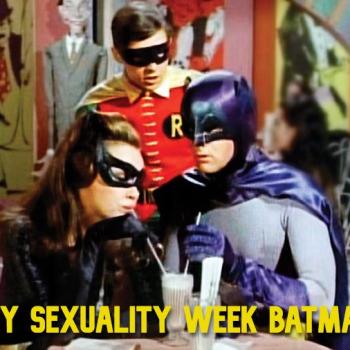As a polytheist and a pluralist who thinks that there are many possible truths, I am obliged to respect people who hold these viewpoints and not do them physical harm, nor deprive them of their bodily integrity or security of person and possessions. But, I can debate them to my heart's content, I can disagree with them, I can resist their efforts to restrain my own freedoms or to demoralize me, and I can even repudiate them and execrate them if they think it is their right and obligation to harm or intimidate me or other queer people. (And, I have and I do, regularly!)
That may seem like an obvious and rather "easy" example, which many people who are modern Pagans or polytheists would probably agree upon without qualification or amendment. There is, then, the question of polytheism itself, and whether or not it can tolerate monotheism or monism as other potential "truths." I would argue that it cannot and it need not, because both of those viewpoints invalidate the basis of polytheism, and thus the experiential core that almost every polytheist upholds and responds to in their theological position as a polytheist. Monotheism and monism cannot be given equal credence as "truths" (or "truth," as they'd probably prefer it!) because they do not allow for pluralism of divine experiences, or for the diversity of approach and ways of life necessary to nature as we understand it to exist at present. (The argument would run similarly in this direction where duotheism and some forms of soft polytheism would be concerned as well.)
That example, too, may seem rather easy and obvious. But, what about all of the recent "wars" in polytheism, over topics like whether or not pop cultural entities are the same as deities, or whether there is a core set of polytheist values, or any number of other potential or actual debates that have erupted and raged across the Pagan and polytheist blogosphere in the past few years? Those are not as easy to generalize, unfortunately.
And, perhaps there's a lesson in that in and of itself. Perhaps what modern proponents of polytheism need to understand, and have often failed to understand, is that every polytheist theological notion is particular, contextual, and individualized, and not only resists generalization, but is to some extent immune to it by its very nature.
The reason that Thor, Zeus, and Ba'al are different is because they developed in close connection to vastly different indigenous cultures; and while historical examples of inter-pantheonic (and generally metaphorical or translational) syncretism certainly exist, that doesn't mean that the deities involved fully merge or are really the same basic (or, to use the term some prefer, "archetypal") being with different masks. Considering them to be "ultimately one" rather than simply "connected" or even "related" is disrespectful to the diversities of the cultures involved, as well as to the beings themselves. If that is the case with deities and with the cultures from which they originate, how much more so will it be the case with individuals today, who do not come from united indigenous cultural traditions, and bring a diversity of background to their individual practices of polytheism with many different deities?
Thinking over my own circles of associates within polytheism, I do not know of anyone that I agree with fully on every single point regarding every deity whose worship we share; even the one person that I probably agree with more than anyone else I've yet encountered still has a number of differences with me on many issues -- some of them rather vital! Nonetheless we get along quite well in most circumstances. When this circle of associates discusses particular theological ideas in blog posts, e-mails, in person (though that happens rarely enough, sadly), and via other means of contact, there are always people who voice their agreement and who feel a certain amount of congruity with a given idea. There are others who don't agree entirely, and might go on to suss out where differences lie while being respectful of those differences, and doing so ends up being quite useful and productive (if for no other reason than better defining what each person's viewpoint actually does encompass). There are others who voice their alternate opinions in these forums, sometimes as a direct challenge to those earlier opinion-staters, and they sometimes do so in a separate venue or subject heading so as not to be confrontational (which generally works, but not always). There are others who don't agree, and think that the other person is "wrong" and needs to be convinced of such. And there are others who don't agree, and who do the prudent thing and simply do not comment, and perhaps do not offer alternatives aloud elsewhere either. I think we can all find ourselves at most of the different positions amongst this full range of options (and between or alongside them, too!) at various points over the years in online Pagan and polytheist discussions, if not more recently than that; I know I've been at all of them at various points in my online interactions over the last decade plus.





